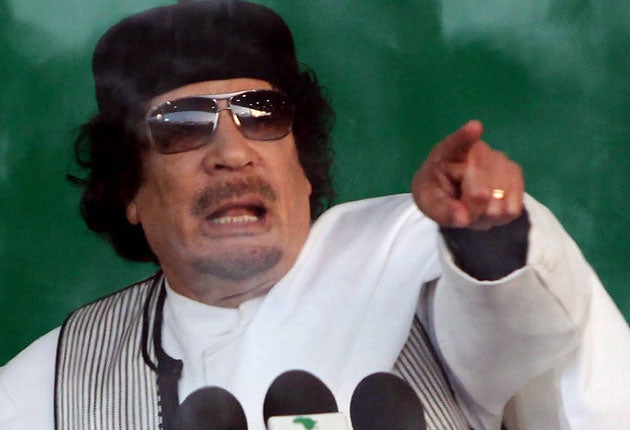The West's Libya policy is a mess
Hague's announcement yesterday is an admission Gaddafi will linger on, writes Adrian Hamilton

Your support helps us to tell the story
From reproductive rights to climate change to Big Tech, The Independent is on the ground when the story is developing. Whether it's investigating the financials of Elon Musk's pro-Trump PAC or producing our latest documentary, 'The A Word', which shines a light on the American women fighting for reproductive rights, we know how important it is to parse out the facts from the messaging.
At such a critical moment in US history, we need reporters on the ground. Your donation allows us to keep sending journalists to speak to both sides of the story.
The Independent is trusted by Americans across the entire political spectrum. And unlike many other quality news outlets, we choose not to lock Americans out of our reporting and analysis with paywalls. We believe quality journalism should be available to everyone, paid for by those who can afford it.
Your support makes all the difference.If the British and French governments now find themselves all over the place in their policy towards Libya and the removal of Colonel Gaddafi, they have only themselves to blame.
On Tuesday, William Hague followed the French Foreign Minister, Alain Juppé (literally – they shared the same podium in Paris), accepting the possibility that Gaddafi and his family could remain in Libya after months in which the two had insisted he would have to go. Yesterday Hague followed France again by announcing that Britain would now recognise the Libyan opposition and eject from London the diplomats representing the old Gaddafi regime.
This is gesture politics of the worst kind. It's meant to show that, while the UK now recognises that it may not be able to get rid of Gaddafi personally, it is still proceeding with promoting regime change. In reality it is simply an acknowledgement of the facts on the ground.
We threw our air weight behind the opposition in the fond belief that this would change the military balance and enable the opposition forces to win the war. They didn't. Instead a stalemate has developed which could well last through the summer. Declaring now that Gaddafi can stay so long as he relinquishes power is just spitting in the wind. The whole point is that the Libyan leader won't relinquish power so long as he thinks he has the military capacity to hold on in at least part of Libya. And that he seems to have.
Over the long term, you can see him being squeezed out simply by economic pressure and the loss of oil revenues. But in the short run, the best policy of the West is not to go on screaming about what he can and cannot do, but to get the opposition to declare a ceasefire and for talks between the sides to begin, whether under the aegis of the UN or the African Union.
The trouble with Western politicians – all politicians – is that of "ownership". Give them a potentially advantageous development such as the Arab Spring and they want to claim a part in it. Given them an event which turns sour such as Yemen or Bahrain and they will distance themselves as far as possible.
But the Arab Spring is not something that can be "owned" in this way. It would be wonderful if great social movements such as the uprisings in the Middle East could just take place peacefully in atmosphere of sweetness and light. But they are ultimately about power and that is determined by all sorts of factors, most of them local.
Western intervention can't work unless you go the whole hog and invade a country and then you're in all the problems we've seen in Iraq and Afghanistan. The best Western policy is discreet observance. Which is not to say that we should sit back and do nothing.
But the best weapons, the best inducements, at our disposal are economic ones. Recognising the National Transitional Council as the true government won't do much. In the end the Libyans themselves are going to have to work out their political destiny.
But we can at least offer Libyans a future in which economic assistance, open markets and freedom of movement offer a better life than they have suffered in the years of autocratic rule and corruption.
Open borders and immigration are, of course, the last thing European politicians are ready to accept. Nor are they willing to offer too much in the way of market access or direct economic support in these days of austerity.
But step back a moment and consider. The Arab Spring could be the best thing to have happened to Europe in a generation, opening up the opportunity not just of a new politics for the whole Mediterranean but an economic renaissance that would take in southern Europe as well as North Africa.
It's time for a bigness of response not a quibbling over the future of Colonel Gaddafi, however unpleasant a man he may be.
Join our commenting forum
Join thought-provoking conversations, follow other Independent readers and see their replies
Comments